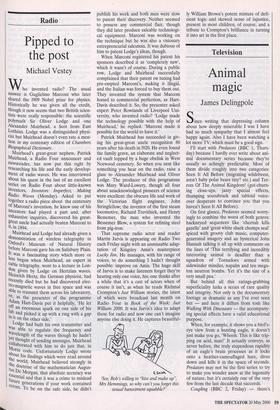Radio
Pipped to the post
Michael Vestey
Who invented radio? The usual answer is Guglielmo Marconi who later shared the 1909 Nobel prize for physics. Historically he was given all the credit, though it now seems that two British scien- tists were really responsible: the scientific Polymath Sir Oliver Lodge and one Alexander Muirhead, a Scot from East Lothian. Lodge was a distinguished physi- cist but Muirhead doesn't even rate a men- tion in my centenary edition of Chambers Biographical Dictionary. Muirhead's great-great nephew, Patrick Muirhead, a Radio Four announcer and newsreader, has now put this right by researching his life and the early develop- ment of radio waves. He was interviewed about his quest in the last of an excellent series on Radio Four about little-known inventors, Inventors Imperfect, Making Radio Waves (Monday). Asked to put together a radio piece about the centenary of Marconi's invention, he knew one of his ancestors had played a part and, after exhaustive inquiries, discovered his great- great uncle had actually beaten Marconi to it, in 1894.
Muirhead and Lodge had already given a demonstration of wireless telegraphy in Oxford's Museum of Natural History before Marconi gave his on Salisbury Plain. It was a fascinating story which more or less began when Muirhead, an expert in cable telegraphy, went to a lecture in Lon- don given by Lodge on Hertzian waves. Heinrich Hertz, the German physicist, had recently died but he had discovered elec- rro-magnetic waves in free space and was able to transmit them across his laboratory, or, as the presenter of the programme Adam Hart-Davis put it helpfully, 'He let off an enormous spark on one side of his lab and picked it up with a ring with a gap in it on the other side.' Lodge had built his own transmitter and was able to regulate the frequency and Wavelength of the waves though he hadn't yet thought of sending messages. Muirhead collaborated with him to do just that, in Morse code. Unfortunately Lodge wrote ,_a‘bout his findings which were read around ".°, e world; Muirhead believed strongly in the doctrine of the mathematician Augus- tus De Morgan, that absolute accuracy was essential and that it was a crime to mislead luture generations if your work contained errors. To be on the safe side, he didn't publish his work and both men were slow to patent their discovery. Neither seemed to possess any commercial flair, though they did later produce saleable technologi- cal equipment. Marconi was working on the technique but he was also a visionary entrepreneurial salesman. It was dubious of him to patent Lodge's ideas, though.
When Marconi registered his patent his sponsors described it as 'completely new', which it wasn't of course. During a public row, Lodge and Muirhead successfully complained that their patent on tuning had pre-empted Marconi's, making it illegal, and the Italian was forced to buy them out. They invented the system that Marconi honed to commercial perfection, as Hart- Davis described it. So, the presenter asked expert Peter Rowlands of Liverpool Uni- versity, who invented radio? 'Lodge made the technology possible with the help of Muirhead,' he replied. 'Marconi made it possible for the world to have it.'
Patrick Muirhead has succeeded in giv- ing his great-great uncle recognition 80 years after his death in 1920. He even found the family grave, an elaborate and neglect- ed vault topped by a huge obelisk in West Norwood cemetery. So when you next like something you hear on the radio, raise a glass to Alexander Muirhead and Oliver Lodge. The producer of this programme was Mary Ward-Lowery, though all four about unacknowledged pioneers of science were excellent: the obscure life and work of the Victorian flight engineer, John Stringfellow; the inventor of the first steam locomotive, Richard Trevithick, and Henry Bessemer, the man who invented the Bessemer Blow, a system for refining steel from pig-iron.
That supreme radio actor and reader Martin Jarvis is appearing on Radio Two each Friday night with an unmissable adap- tation of Kingsley Amis's masterpiece Lucky Jim. He manages, with his range of voices, to do something I hadn't thought possible: improve on Amis. The huge skill of Jarvis is to make listeners forget they're hearing only one voice, his; one thinks after a while that it's a cast of actors when of course it isn't, as when he reads Richmal Crompton's Just William stories, the latest of which were broadcast last month on Radio Four in Book of the Week: Just William 2000. It was Jarvis's idea to adapt these for radio and now one can't imagine anyone else doing it. He captures beautiful- `See, Bob's willing to "kiss and make up", Mrs Hemmings, so why can't you forget this sexual harassment squabble?' ly William Brown's potent mixture of defi- cient logic and skewed sense of injustice, present in most children, of course, and a tribute to Crompton's brilliance in turning it into art in the first place.









































































 Previous page
Previous page